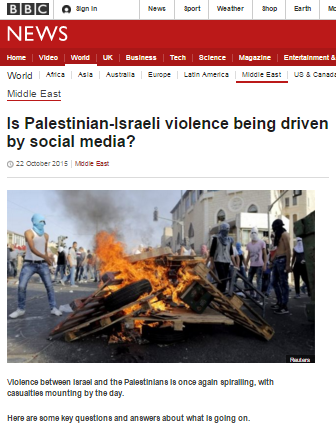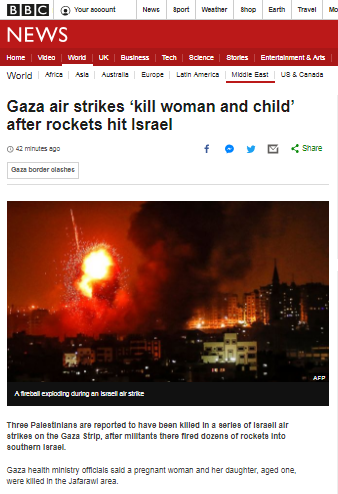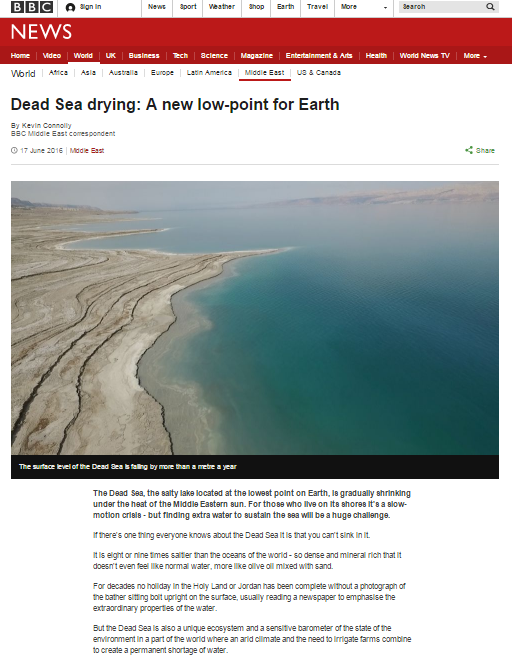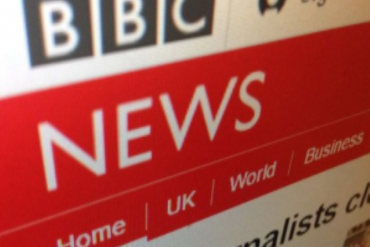Back in October 2015 the BBC News website produced a much amended and problematic backgrounder titled “Is Palestinian-Israeli violence being driven by social media?”. As was noted here at the time, readers were not provided with substantial answers to the question asked in the headline and the issue of the spread of incitement and glorification of terrorism on social media accounts run by official Palestinian Authority bodies and Fatah was not addressed at all.
That article included the following statements:
“Israel says the Palestinian leadership is inciting attacks, and that the attackers are driven not by political frustration but by a radical religious ideology which opposes Israel’s very existence.
Palestinian Authority President Mahmoud Abbas has blamed “acts of aggression” by the Israeli authorities and Jewish settlers for the latest violence.”
Subsequent reporting has not produced any further examination of the issue of religious ideology as a component in motivation for terrorism and in the months since that article was published the BBC has adopted a standard ‘explanation’ for the ongoing wave of violence which confines itself to political factors:
“The recent rise in violence is blamed by Palestinians on the continued occupation by Israel of the West Bank and the failure of the Middle East peace process.
Israel accuses Palestinian leaders and Islamist groups of inciting the violence.”
Neither has there been any further examination since October of the role played by social media in inciting the violence and the topic of incitement from official sources continues to remain out-of-bounds as far as the BBC is concerned.
On February 14th the BBC reported on an incident which took place near Hinanit.
“In the first incident on Sunday, the Israeli army says that two boys were throwing rocks at passing cars near Jenin in the northern West Bank.
When a patrol arrived at the scene, the army says one of them opened fire with a rifle.
The soldiers fired back and killed the two Palestinians. Both are said to have been 15 years old.”
The ITIC has produced an interesting report which examines the use of social media by one of those attackers.
“A comparison of Nihad Waked’s Facebook page with those of other terrorists during the terrorist campaign revealed several similar themes:
1) Expression of the desire to sacrifice life [for the sake of Allah]: The Facebook pages of Nihad Waked and other terrorists frequently mention the desire to sacrifice their lives as shaheeds. (Nihad Waked wrote, “…let the mother be ashamed…who does not have a son who is a shaheed,” February 7, 2016).
2) Serial postings: Nihad Waked posted messages to his Facebook page which in retrospect show the maturing of the idea to carry out a terrorist attack and sacrifice his life. His messages were similar to those other terrorists posted in the weeks and sometimes months before they carried out attack (Nihad Waked wrote, “Rejoice aloud, gun, and wake the sleepers, tell them that without blood Palestine will not be restored,” October 24, 2015).
3) Pictures and references to weapons: Nihad Waked and other terrorists posted pictures or mentioned rifles and other weapons (On August 16, 2015, he posted a picture, apparently of himself, holding a rifle. The Arabic read, “Raise your head…this is your weapon”).
4) Terrorists who were killed as role models: Nihad Waked posted a picture of Fadi Alloun, who was killed on October 4, 2015 while carrying out a stabbing attack in Jerusalem. Other terrorists used their Facebook pages to identify with shaheeds who died during the current terrorist campaign, whom they regarded as role models and sources of inspiration.
5) Religious or semi-religious justification for death: Nihad Waked’s Facebook page has a quotation from the Qur’an often used during the second intifada relating to the fate of the shaheeds after death (“…do not think of those who have been killed in Allah’s way as dead. Rather, they are alive with their Lord, well provided for” [3:169]). In previous instances terrorists used a saying popular on the Internet and the social networks, about “things that come from heaven…like the rain, like luck…like death.””
BBC audiences, however, continue to be told that the violence is attributable to the “failure of the Middle East peace process”.




